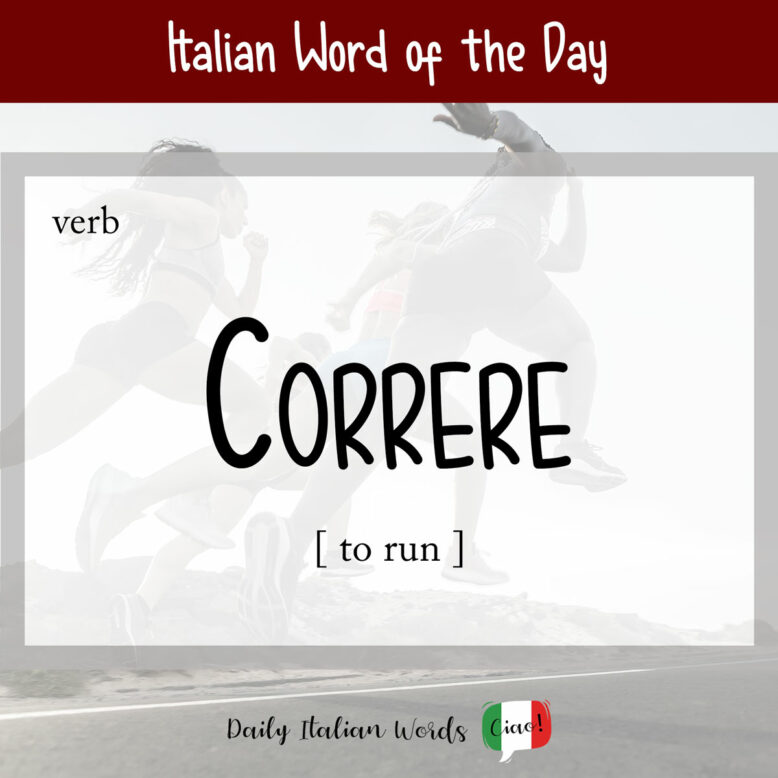I’m the first to admit that we don’t spend enough time discussing verbs here on Daily Italian Words, so today, let’s dive into one that you’ll encounter frequently in everyday conversation—correre (to run).
correre
to run

The origin of correre is quite straightforward—it comes from the Latin currĕre, which carries the same meaning.
Correre is a regular -ERE verb, meaning it follows this conjugation pattern in the present tense:
- io corro = I run
- tu corri = you run (informal, singular)
- lui corre = he runs
- lei corre = she runs
- Lei corre = you run (formal)
- noi corriamo = we run
- voi correte = you run (plural)
- loro corrono = they run

The past participle of correre is corso, and it can take either avere (to have) or essere (to be) as its auxiliary. However, be careful—its meaning shifts slightly depending on which auxiliary you use.
You need to use essere when describing movement toward a destination, while avere is used when the focus is on the action of running itself, rather than where you’re going.
Compare the two examples below: in the first, the emphasis is on the act of running itself, whereas in the second, the focus is on the destination (i.e. the train).
Oggi ho corso per due ore senza fermarmi!
Today I ran for two hours without stopping.
Sono corsa alla stazione a prendere il treno.
I ran to the station to catch the train.
The primary translation of correre is to run, typically referring to fast movement on foot by humans or on paws by animals. However, this verb has a wide range of other meanings, both literal and figurative, as we’ll discover below.
First of all, correre can mean to race or to drive in the context of sports, particularly motor racing. For example, the phrase corre troppo in macchina means he/she drives too fast (literally, “he/she runs too fast in the car”).

Legs aren’t the only things that corrono in Italian! The verb can also describe a hand moving swiftly to grab something or a glance darting quickly in a certain direction.
Correre can also be used figuratively for something intangible that moves quickly. For example, the phrase corre voce che means it is rumoured that (literally, “the voice runs that…”), while il tempo corre (literally “time is running”) translates to time is getting on. You may also hear it used to describe trends that suddenly take off or when someone needs to complete something in a hurry.
Corre voce che stiano per divorziare.
It is rumoured that they are on the verge of divorce.
Devo correre per finire i miei compiti.
I have to rush to finish my homework.
Just like in English, correre can describe how a road or river unfolds in a certain direction or follows a path. For example, la strada corre lungo il mare means the road runs along the sea. Likewise, it can refer to the space between two points, either physically or metaphorically, as in the following phrases:
- tra le due città corrono 2 chilometri = the cities are separated by 2 kilometres
- tra me e te a badminton corre un abisso = you are much better at badminton than me (literally “there runs an abyss between you and me”)
It’s also very common to see correre used to describe an extended period of time or a negative period of time, as in the phrases:
- con i tempi che corrono = in these difficult times (literally “in the times that run”)
- correva l’anno 1985 = it was the year 1985 (literally “the year 1985 was running”)
A fun idiomatic expression with which you may not be familiar is Ci corre! which translates to There’s a big difference! or literally “it runs.” It uses the pronominal verb corrercene, which means to be a significant difference.
Tra il libro e il film ce ne corre.
There is a big difference between the book and the film.
Sometimes, correre can be used transitively to describe facing or encountering something negative or dangerous. For example, just as English has the expression to run the risk, Italian uses the exact equivalent: correre il rischio.

Idiomatic expressions using ‘correre’
Correre l’obbligo
Literal translation: the obligation runs
English meaning: to feel you have an obligation to do something
Correre la cavallina
Literal translation: to run the leapfrog
English meaning: to live the good life without worrying about future events
Correre dietro a qualcosa/qualcuno
Literal translation: to run after something/someone
English meaning: to desire, to chase after something/someone
Lasciar correre
Literal translation: to let (something) run
English meaning: to let (something) go / slide
Heather Broster is a graduate with honours in linguistics from the University of Western Ontario. She is an aspiring polyglot, proficient in English and Italian, as well as Japanese, Welsh, and French to varying degrees of fluency. Originally from Toronto, Heather has resided in various countries, notably Italy for a period of six years. Her primary focus lies in the fields of language acquisition, education, and bilingual instruction.


